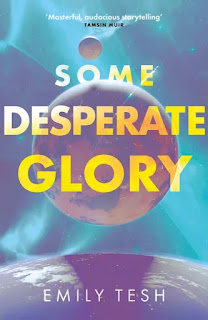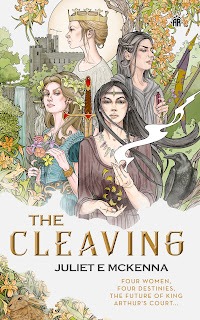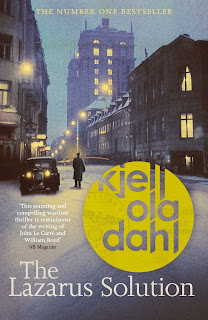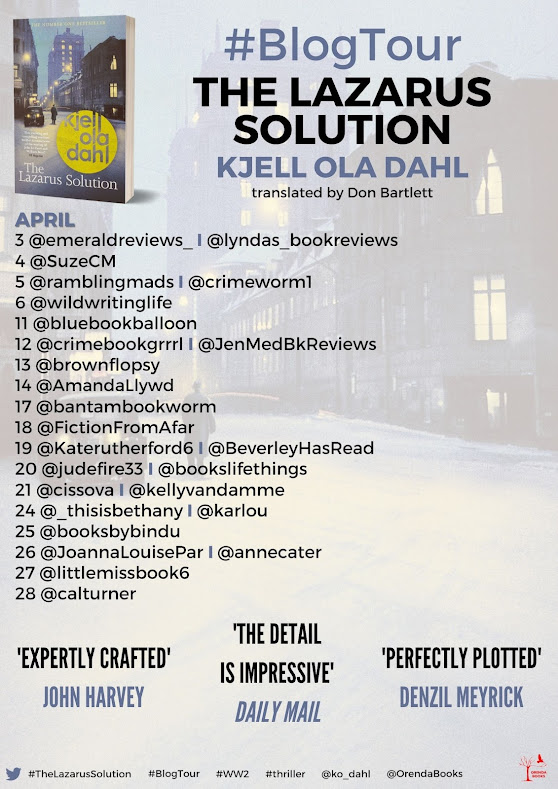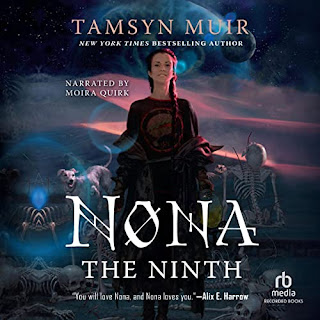Emily Tesh
Orbit, 13 April
Available as: HB, 438pp, e, audio
Source: Advance copy
ISBN(HB): 9780356521831
I'm grateful to Orbit for an advance copy of Some Desperate Glory to consider for review.
"While Earth's children live, the enemy shall fear us".
This is a wonderful book.
Following Kyr, a young woman growing up in a remote space colony, Gaea, which has a very militaristic culture, we learn about a wider universe. About Earth, destroyed by alien attackers. About the humans - the last remnant living on that rock, and the aliens - all conquering, under the aegis of "the Wisdom", a mysterious force or intelligence that guides entire peoples, entire planets.
Kyr is one of the best warriors of her generation, genetically enhanced for warfare, trained remorselessly to avenge Earth, and now hoping for an assignment to one of the military wings of her people. Imagine her horror when instead she's assigned to the Nursery - facing a future bearing a child every two years to replenish Gaea's population. A future where she's offered as a privilege to the fighting men. Appalled at the prospect, Kyr takes her fate into her own hands and sets out on a self-defined mission to wage terror against those she perceives as traitors and collaborators. Because, no, the inhabitants of Gaea aren't actually the only humans left...
Emily Tesh produces a miracle of characterisation with Kyr. She is, frankly, a very unlikable charcetsr - the perfect little soldier, fanatical and devoted to the cause. She's disliked by her messmates, moody, committed, totally un self-aware. Yet you'd have to have a heart of stone not to sympathise with her, faced with a duty - the one duty - she simply can't bear. It seems she's been totally betrayed by the culture she hero-worships, and while the reader will soon spot just how rotten a culture that is, Kyr is conditioned, no radicalised, to serve it so the only way she can rationalise her rebellion is to commit to a higher cause, almost greedily seeking death for glory.
That's the jumping off point for a remarkable journey of self-discovery, change and growth, in which Kyr discovers far more about the truth behind Gaea, about the paradox of the Wisdom, and about the variety of people who occupy the universe. It's an affirming journey in which we can recognise and celebrate Kyr's true qualities (beyond simply the supersoldier thing). She will need those qualities as all she's ever known is thrown into the melting pot and strange new worlds emerge.
This is far from a simplistic tale of good vs bad (whether gentle, innocent aliens faced by human colonisers, or hapless humans menaced by monsters from space). It raises questions (on multiple levels) about the role of the individual vs the collective, about personal freedom, about just what constitutes personhood - and about giving up on long nurtured revenge. At heart, perhaps, it is about duty and about that moment when one is forced to think for onself and really, really consider what duty means.
All that, and this is a book of glorious prose with a driving, urgent pace in service of a rattling good story. Really a book you won't want to put down till you reach the last page.
